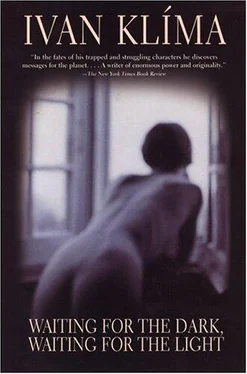'It's just eight, Comrade President.'
'I can't possibly sleep before midnight. What are we going to do?'
'Shall I call the projectionist?'
The old man shakes his head almost imperceptibly.
'The librarian? Or your maid?'
The old man hesitates a moment, then shakes his head, walks through the hall and enters the conservatory where he keeps snakes in terraria. He stops in front of the terrarium where the Gabon viper lives. He leans close to the glass and appears to be examining the horn coming out of the centre of the serpent's flat skull. 'My poor dear wife liked them,' he says. Tears run down his cheeks. With his back still to the valet, he gives an order. 'Tea in my study.'
Two of the four walls of his study are covered, floor to ceiling, with shelves full of books, but he hasn't had time to read them for years. Now he walks past the bookshelves and stops at a table on which a neatly stacked pile of folders stands between two telephones. He opens the top folder and leafs through it, looking around the room as he does so. He closes the folder again, walks over to the window, leans on the sill and, hidden by the curtains, looks out into the garden. Pathways sifted with bright white sand diverge, converge and criss-cross over well-kept lawns, and on the upper part of a slope, windblown bushes and purple rhododendrons have scattered their
petals on the grass. In the lower section, among the boulders of a rock garden, three men potter about, pretending to plant something.
Perhaps they are real gardeners, but he never knows what the people around him are — what they really are.
For a moment he considers going into the garden and speaking to one of them, asking him what his real job here is, or what he really thinks. What do you think about our new society? What do you expect from the future?
Genuine gardeners or not, they would still not answer him truthfully. They've been chosen carefully and trained even more carefully. Not about flowers, but about what to say if they should meet him.
One of the men is now coming down the path with a bouquet of white flowers in his hand, walking towards the château. The president watches him until the man disappears into the entrance, then he turns, walks away from the window and sits down in a deep armchair. He reaches out for the folder he was looking at earlier, leafs through it again and examines at the clusters of letters whose individual shapes he can no longer distinguish.
Someone knocks on the door, and when he gives permission to enter, the valet comes in with the soundless tread of a cat. He is bringing flowers and tea. With fluid movements he sets the china cups and saucers on the glass table-top, then puts the vase with the white flowers on the window-ledge. The valet is a small, thin man. His greyish-yellow face is indecipherable. It reveals neither willingness not deference.
'What's that you've brought?'
'Your favourite white peonies, Comrade President.'
'My favourite?' whispers the president. 'It was my wife who loved them, my poor wife. She loved to look at them. I. . ' He stops. Then he adds: 'Just recently, I find things are blurred. They want me to have an operation'—he points to his eyes—'but I'll be hospitalized, and what will happen here? Then the doctors with the knives — who will assure me that they are genuine doctors?' He stops, because he has said something that he could have said to his wife, with whom he still carries on conversations,
although not usually in front of the valet. He reaches for the cup of tea and dismisses the valet with a wave of his hand.
Indeed, since his wife's tragic death, he speaks to her more often than he did when she was alive. Perhaps it's because now she can be near him at all times.
After the valet has left, he complains to her that his comrades are increasingly plotting against him and spreading malicious gossip among the people through the familiar channels.
His wife, God rest her soul, thinks he should do something to regain the people's favour. He could lower prices, or grant someone a special favour.
Favour for whom? he wonders.
Has he already forgotten that when he came to power, years ago, he had had to banish from public life many important officials who refused to acknowledge the immutable reality of his government? That he got rid of most of the old guard and disbanded most of the military command units? That he drove professors from the universities and silenced all the journalists, film-makers and writers who had displayed the slightest sign of insubordination? Some of the more defiant ones escaped abroad, and several ended up in prison. But most of them had taken refuge in the twilight zone of menial work in warehouses, boiler-rooms and other places of asylum. What if he were to show magnanimity towards some of them? Doing so would certainly spark hope in many others, thus dulling their resistance to his government and throwing his enemies into disarray. He could even grant clemency to someone condemned to death, and so enhance his reputation abroad. He recalls how he himself had once waited in a cell for a trial in which it seemed the only possible outcome was the death sentence, though he was completely innocent. They condemned him to life in prison.
At the time, oddly enough, he hadn't worried about death, nor thought about the hopelessness of his situation. On the contrary, he imagined himself coming out of prison and returning to the comrades from whom he had been forcibly separated by his enemies' intrigues, and he was certain that he would continue towards his ultimate goal of
being first among them all. He imagined that once he finally held the reins of government in his hands, he would summon everyone who had wronged him: the interrogators who had tortured him for long days and nights to drag absurd confessions out of him, and the prison guards who had tormented him with thirst and cold, or had dragged him into freezing, damp solitary confinement for the slightest misdemeanour. And of course he would summon the public prosecutor, a successful and dedicated son of the nation and the working people, who had railed against him as though he were a sell-out and a traitor; and the false witnesses; and the scheming chairman of the tribunal who didn't hesitate to condemn him for the duration of his life to prison. He would have them all summoned and lined up in the hall where he usually received foreign dignitaries and heads of state and he would ask them to say what they thought of him now? And he'd watch them sweat with terror, and he would be amused as they fumbled to explain that they had always admired him, that they had merely obeyed orders and had acted against their own convictions.
He had only made the first and most difficult of his dreams come true: he had become the head of state, the first man in the country. Yet those who had once stood in judgement over him went on judging, and his interrogators went on interrogating. He preferred not to look into what had become of them. He now understood that all those who had wronged him were virtually indistinguishable from those who had not. The latter had simply never been given the opportunity. The difference was only that fear had now transformed those who had genuinely wronged him into loyal supporters.
His wife, God rest her soul, is now waiting for an answer. Yes. He will do something, but when the right time comes. Tomorrow a nigger from some country — and he doesn't even know where it is — is arriving on an official visit. He still has to read his briefing papers and check the menu to make sure they haven't forgotten to include the fillet of trout meunière.
Yes, he will make a grand gesture, but it won't accomplish anything. Everyone is just waiting for him to trip up so
they can push him out. That's the way people are: envious, only out for themselves. Given half a chance, they would raze their houses to the ground, reduce bridges to nuts and bolts, roads to cobblestones, machines to gearwheels; they would grind bones into dust. They would burn everything down, for fire is their passion. From his study of history, he knows that people are arsonists at heart. They look at churches, castles and palaces and dream of seeing them go up in flames.
Читать дальше











